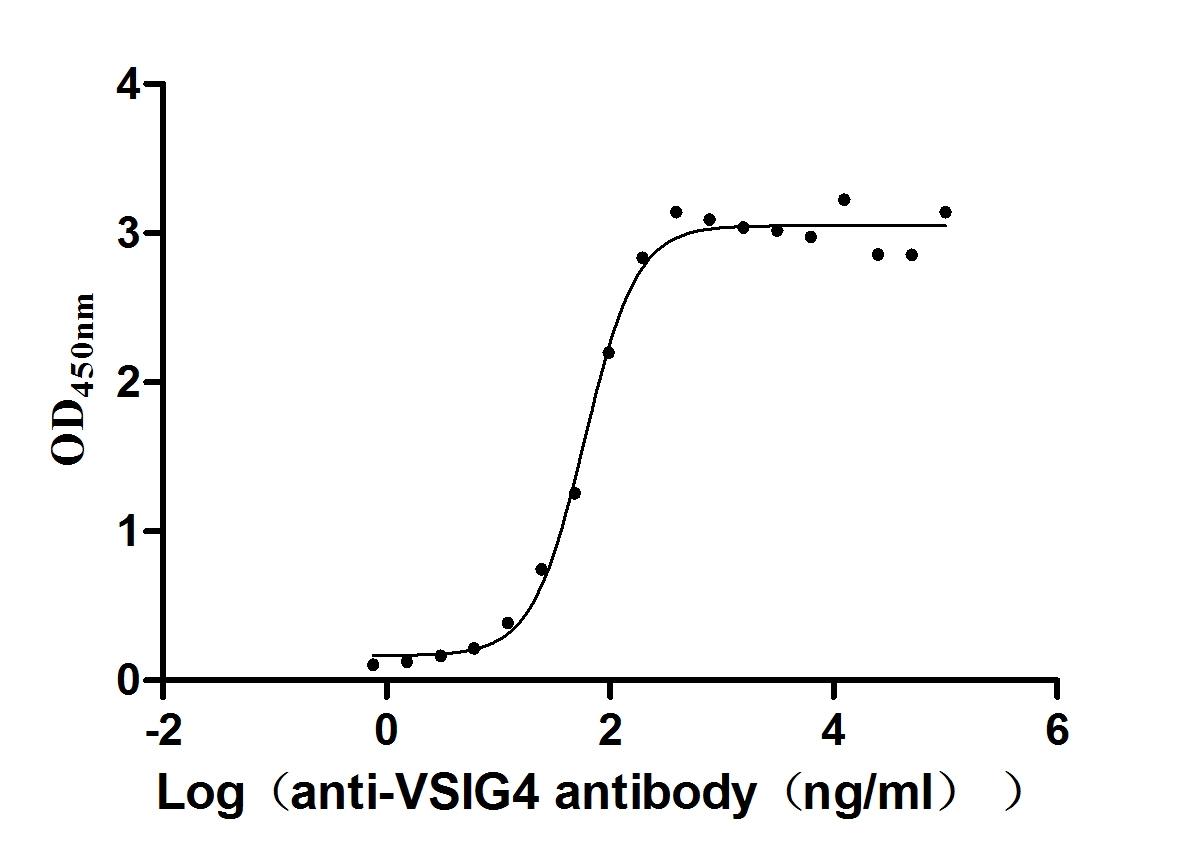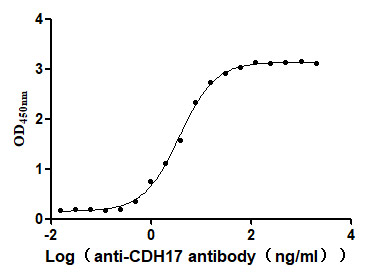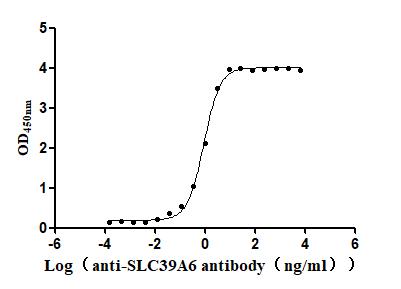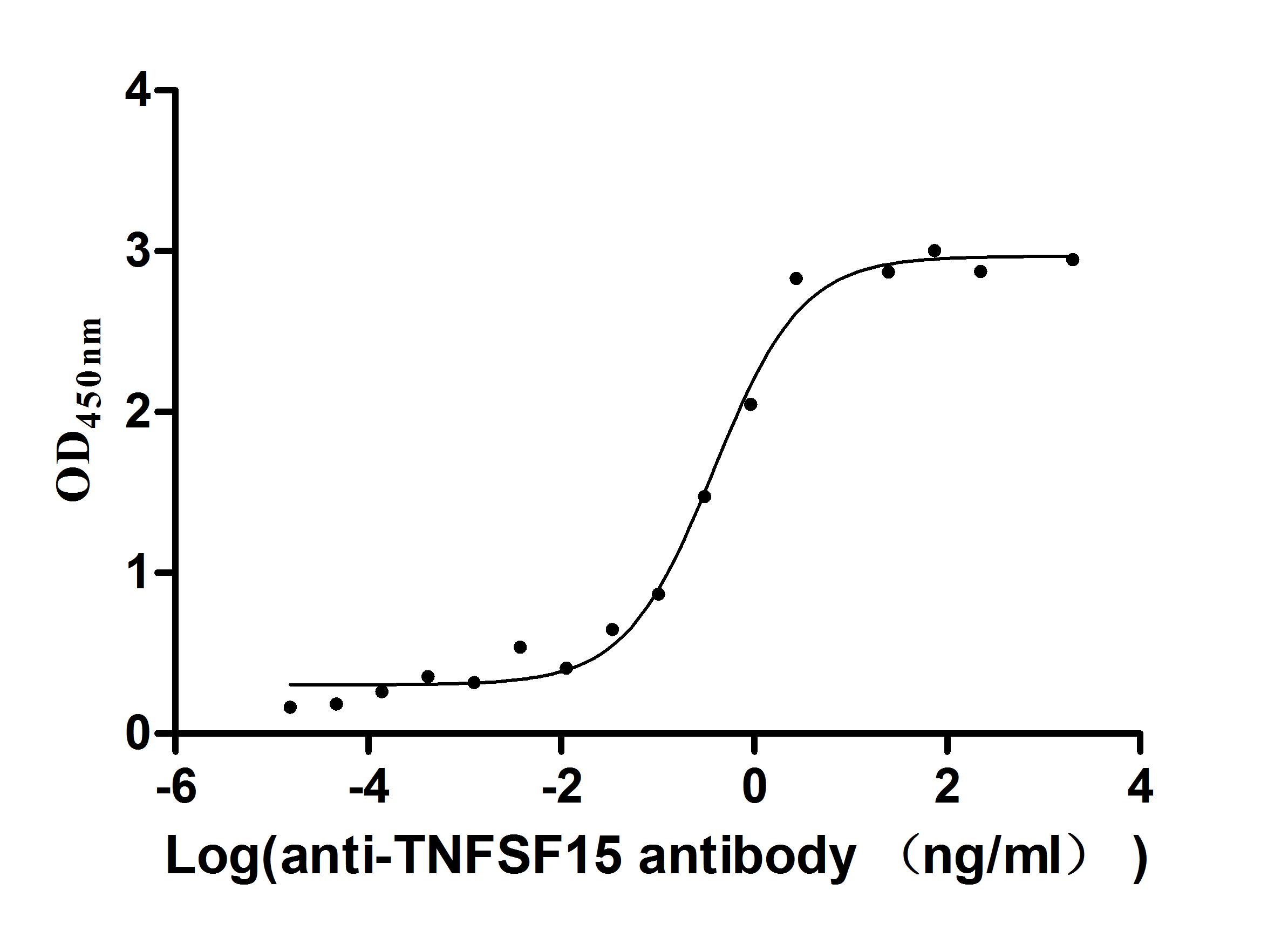Recombinant Human Transcription factor AP-2-beta (TFAP2B)
-
货号:CSB-YP852874HU
-
规格:
-
来源:Yeast
-
其他:
-
货号:CSB-EP852874HU
-
规格:
-
来源:E.coli
-
其他:
-
货号:CSB-EP852874HU-B
-
规格:
-
来源:E.coli
-
共轭:Avi-tag Biotinylated
E. coli biotin ligase (BirA) is highly specific in covalently attaching biotin to the 15 amino acid AviTag peptide. This recombinant protein was biotinylated in vivo by AviTag-BirA technology, which method is BriA catalyzes amide linkage between the biotin and the specific lysine of the AviTag.
-
其他:
-
货号:CSB-BP852874HU
-
规格:
-
来源:Baculovirus
-
其他:
-
货号:CSB-MP852874HU
-
规格:
-
来源:Mammalian cell
-
其他:
产品详情
-
纯度:>85% (SDS-PAGE)
-
基因名:TFAP2B
-
Uniprot No.:
-
别名:Activating enhancer binding protein 2 beta; Activating enhancer-binding protein 2-beta; AP 2B; AP2 B; AP2-beta; AP2B; AP2B_HUMAN; AP2beta; MGC21381; OTTHUMP00000039925; PDA2; TFAP 2B; Tfap2b; Transcription factor AP 2 beta; Transcription factor AP-2-beta; Transcription factor AP2 beta
-
种属:Homo sapiens (Human)
-
蛋白长度:full length protein
-
表达区域:1-460
-
氨基酸序列MHSPPRDQAA IMLWKLVENV KYEDIYEDRH DGVPSHSSRL SQLGSVSQGP YSSAPPLSHT PSSDFQPPYF PPPYQPLPYH QSQDPYSHVN DPYSLNPLHQ PQQHPWGQRQ RQEVGSEAGS LLPQPRAALP QLSGLDPRRD YHSVRRPDVL LHSAHHGLDA GMGDSLSLHG LGHPGMEDVQ SVEDANNSGM NLLDQSVIKK VPVPPKSVTS LMMNKDGFLG GMSVNTGEVF CSVPGRLSLL SSTSKYKVTV GEVQRRLSPP ECLNASLLGG VLRRAKSKNG GRSLRERLEK IGLNLPAGRR KAANVTLLTS LVEGEAVHLA RDFGYICETE FPAKAVSEYL NRQHTDPSDL HSRKNMLLAT KQLCKEFTDL LAQDRTPIGN SRPSPILEPG IQSCLTHFSL ITHGFGAPAI CAALTALQNY LTEALKGMDK MFLNNTTTNR HTSGEGPGSK TGDKEEKHRK
-
蛋白标签:Tag type will be determined during the manufacturing process.
The tag type will be determined during production process. If you have specified tag type, please tell us and we will develop the specified tag preferentially. -
产品提供形式:Lyophilized powder
Note: We will preferentially ship the format that we have in stock, however, if you have any special requirement for the format, please remark your requirement when placing the order, we will prepare according to your demand. -
复溶:We recommend that this vial be briefly centrifuged prior to opening to bring the contents to the bottom. Please reconstitute protein in deionized sterile water to a concentration of 0.1-1.0 mg/mL.We recommend to add 5-50% of glycerol (final concentration) and aliquot for long-term storage at -20℃/-80℃. Our default final concentration of glycerol is 50%. Customers could use it as reference.
-
储存条件:Store at -20°C/-80°C upon receipt, aliquoting is necessary for mutiple use. Avoid repeated freeze-thaw cycles.
-
保质期:The shelf life is related to many factors, storage state, buffer ingredients, storage temperature and the stability of the protein itself.
Generally, the shelf life of liquid form is 6 months at -20°C/-80°C. The shelf life of lyophilized form is 12 months at -20°C/-80°C. -
货期:Delivery time may differ from different purchasing way or location, please kindly consult your local distributors for specific delivery time.Note: All of our proteins are default shipped with normal blue ice packs, if you request to ship with dry ice, please communicate with us in advance and extra fees will be charged.
-
注意事项:Repeated freezing and thawing is not recommended. Store working aliquots at 4°C for up to one week.
-
Datasheet :Please contact us to get it.
相关产品
靶点详情
-
功能:Sequence-specific DNA-binding protein that interacts with inducible viral and cellular enhancer elements to regulate transcription of selected genes. AP-2 factors bind to the consensus sequence 5'-GCCNNNGGC-3' and activate genes involved in a large spectrum of important biological functions including proper eye, face, body wall, limb and neural tube development. They also suppress a number of genes including MCAM/MUC18, C/EBP alpha and MYC. AP-2-beta appears to be required for normal face and limb development and for proper terminal differentiat...显示更多
-
基因功能参考文献:
- Data suggest that expression of TFAP2B in lobular carcinoma in situ and invasive lobular breast cancer is up-regulated as compared to control mammary gland epithelium; TFAP2B appear to be involved in regulation of cell proliferation in these slow-growing breast cancer subtypes. PMID: 29035379
- previously, only 10 different pathogenic variants in the TFAP2B gene have been associated with the Char syndrome and patent ductus arteriosus (human gene mutation database subscription). We have thus identified the 11th mutation, namely, c.851T>C, p. Leu284Ser, which cosegregates with the phenotype. PMID: 29683802
- study demonstrates that AP-2beta promotes tumor growth and predicts poor prognosis, and may represent a potential therapeutic target for breast cancer. PMID: 29972820
- Reduced TFAP2B expression in EC was significantly associated with high grade (OR=2.2 for well, moderate vs. poor), stage (OR=2.5 for I vs. IV), histology (OR=1.8 for serous vs. endometrioid), distant metastasis (OR=2.4 for positive vs. negative) (all p-values<0.05). PMID: 29602546
- TFAP2B mutation is associated with tooth abnormalities. PMID: 28381879
- AP-2 beta and beta-catenin interact both in vitro through GST pull-down assays and in vivo by co-immunoprecipitation. We further identified the interaction regions to the DNA-binding domain of AP-2 beta and the 1-9 Armadillo repeats of beta-catenin. PMID: 28277615
- Single nucleotide polymorphisms (SNP) in angiotensin II receptor, type 1 (AGTR1), transcription factor AP-2 beta (TFAP2B), and tumor necrosis factor receptor-associated factor 1 (TRAF1) have been reported to be associated with the incidence of PDA in preterm infants. PMID: 26615960
- results suggest that TFAP2B is playing a vital role in retaining retinoic acid responsiveness and mediating noradrenergic neuronal differentiation in neuroblastoma. PMID: 26598443
- The presence of the nine-repeat variant of the TFAP-2beta intron 1 VNTR appears to protect girls with ADHD symptoms from the co-expression of symptoms of depression. PMID: 23824473
- The expression of TFAP-2beta mRNA in tissue of patients with endometrial carcinoma was higher than that of normal endometrium. The expression of TFAP-2beta mRNA in endometrial tissue of patients with metabolism syndrome was higher than that of lean ones. PMID: 26189251
- TFAP2B overexpression contributes to tumor growth and a poor prognosis of human lung adenocarcinoma through modulation of ERK and VEGF/PEDF signaling. PMID: 24766673
- The AP-2beta polymorphism significantly influenced cognitive performance, whereas the MAOA and COMT polymorphisms did not. PMID: 23881096
- A haploinsufficiency effect of TFAP2B could be involved in familial isolated patent ductus arteriosus. PMID: 24507797
- TFAP2B rs987237 and dietary protein/carbohydrate interacted to modify weight maintenance. PMID: 24081236
- genomic GATA4 and TFAP2B missense mutations may be associated with nonfamilial congenital heart disease with diverse clinical phenotypes in patients with congenital heart disease from southern China PMID: 22959235
- Under energy restriction, TFAP2B may modify the effect of dietary fat intake on weight loss and waist reduction PMID: 22952648
- The findings suggest the lack of involvement of known mutations of TFAP2B with syndromic or nonsyndromic CHDs in Mysore patients PMID: 22199100
- TFAP2B mutation should be considered a risk factor for isolated PDA. However, the detailed genetic mechanism underlying nonsyndromic the PDA-causing TFAP2B mutation is yet to be elucidated. PMID: 21643846
- This study supports a role of the SLC6A4, DRD4 and TFAP2B genes in the temperament, including a gene-gene interaction between SLC6A4 and TFAP2B. It also provides evidence about an effect of the TFAP2B polymorphism in TFAP2B gene transcription. PMID: 21504541
- A novel splice-junction in TFAP-2B gene might lead to hereditary patent ductus arteriosus in a Chinese family. PMID: 21215182
- central obesity-associated variants in LYPLAL1, NRXN3, MSRA, and TFAP2B PMID: 21674055
- It causes accumulation of neutral fats and causes insulin resistance through exaggerated glucose uptake independent of insulin and induces abnormal adipokine secretion, fat cell enlargement and insulin resistance. PMID: 21766608
- Loss of TFAP2B is associated with retinoblastoma. PMID: 20607706
- TFAP2B seems to regulate the expression of various adipokines in vivo PMID: 20019683
- The present study identifies TFAP2b as a suggestive candidate gene in alcohol dependence. PMID: 19778525
- no association between a transcription factor Activating Protein 2beta (AP-2beta) gene variant and schizophrenia PMID: 12270648
- AP-2beta intron 2 genotype is associated with low levels of anxiety-related personality traits in women. PMID: 14673213
- No association between the AP-2beta genotype and measures of dopamine receptor density, or CSF 5-HIAA concentrations. PMID: 15057523
- AP-2beta expression was observed in the low-stage subtypes of renal cell carcinoma, and this transcription factor may be related to early carcinogenesis. PMID: 15245963
- No differences are observed in AP-2 beta genotype frequencies between 176 subjects with premenstrual dysphoric disorder (PMDD) and 91 healthy controls. PMID: 15722186
- Genetic variations in the gene encoding TFAP2B are associated with type 2 diabetes mellitus. PMID: 15940393
- TFAP2B may contribute to the pathogenesis of type 2 diabetes through regulation of adipocytokine gene expression, and that TFAP2B may be a promising target for treatment or prevention of this disease. PMID: 16373396
- Boys and girls with the combination of presence of the short 5-HTTLPR, and homozygosity for the long AP-2beta genotype scored significantly lower on Self-Transcendence and Spiritual Acceptance. PMID: 17123722
- Investigators speculate on the possible role of TFAP2B gene on the duplicated segment in the three reported cases of partial trisomy. PMID: 17185054
- TFAP2B was validated as direct target gene mediating the anti-apoptotic function of PAX3/FKHR PMID: 17525748
- L-PGDS gene expression in TE671 cells was activated by USF1 through the aE-box within intron 4 and cooperatively by AP-2beta in the promoter in a cell-type-specific manner. PMID: 17574780
- a potential usefulness of AP-2beta polymorphisms in explaining or predicting central nervous diseases, drug effects and side effects. PMID: 18358611
- Novel TFAP2B mutation in nonsyndromic patent ductus arteriosus is reported. PMID: 18752453
- Reduction of TFAP2B expression could have a protective effect against future risk of complications associated with decreased insulin sensitivity and central adiposity, such as type 2 diabetes and coronary heart disease. PMID: 19325541
- TFAP2B, LYPLAL1 and MSRA are associated with adiposity and fat distribution. PMID: 19557161
- AP-2beta directly inhibits adiponectin gene expression by displacing NF-YA and binding to its promoter. PMID: 16954217
- Novel TFAP2B mutations causing Char syndrome have a dominant-negative effect and provide a genotype-phenotype correlation. PMID: 11505339
收起更多
-
相关疾病:Char syndrome (CHAR); Patent ductus arteriosus 2 (PDA2)
-
亚细胞定位:Nucleus.
-
蛋白家族:AP-2 family
-
数据库链接:
HGNC: 11743
OMIM: 169100
KEGG: hsa:7021
STRING: 9606.ENSP00000377265
UniGene: Hs.33102


-AC1.jpg)















